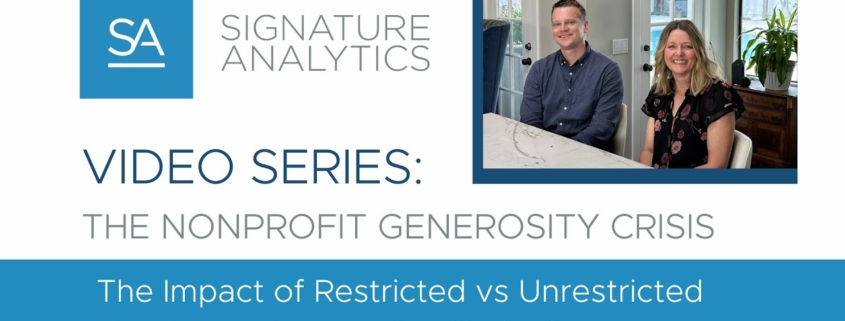The Impact of Restricted vs Unrestricted Funds on a Nonprofit’s Cash Flow
Nonprofit organizations play an essential role in addressing societal issues and serving communities. While their primary goal isn’t profit maximization, managing finances effectively is vital for their sustainability and impact. One significant aspect of nonprofit financial management is understanding the difference between restricted and unrestricted funds and their impact on cash flow.
In the video below, Jason Kruger, Founder and President, and Laura Bertagnolli, Consulting CFO, dive into how these fund types affect cash flow management and the critical need for unrestricted funding to ensure operational flexibility and mission success.
Read on to learn how these funds influence a nonprofit’s financial health.
What are Restricted and Unrestricted Funds?
Restricted funds are donations or grants designated by the donor for a specific purpose or program. These funds come with restrictions on how they can be used, often outlined by the donor or grantor. In contrast, unrestricted funds are contributions that don’t come with specific restrictions. Nonprofits have more flexibility in using unrestricted funds to cover operational expenses, salaries, or other needs as they see fit.
“So you’re actually required, with generally accepted accounting principles to split out now and show your net assets, restricted versus unrestricted, and also required by the donor or by that contractor grant to make sure that whatever monies you’re spending are in compliance with the exact purpose that they gave you the funding for.”
The Impact on Cash Flow:
Restricted Funds
Limited Flexibility: While restricted funds are earmarked for specific purposes, they can’t be freely allocated to cover other expenses. This restriction can create challenges in managing cash flow, especially if the organization relies heavily on restricted donations.
Timing Issues: Sometimes, nonprofits receive restricted funds in advance for projects or programs scheduled for the future. Managing cash flow becomes crucial to ensure these funds are available when needed, without compromising other ongoing operations.
Reporting Requirements: Nonprofits often have reporting obligations to donors or grantors regarding the use of restricted funds. Meeting these requirements adds another layer of administrative burden but is crucial for maintaining donor trust and compliance.
Unrestricted Funds
Operational Stability: Unrestricted funds provide essential support for day-to-day operations, offering flexibility to cover immediate needs such as rent, utilities, and salaries. They act as a financial cushion during lean times or unexpected expenses.
Strategic Allocation: Nonprofits can strategically allocate unrestricted funds to areas where they are most needed, whether it’s investing in new programs, expanding existing ones, or building organizational capacity.
Sustainability: A healthy balance of unrestricted funds contributes to the long-term sustainability of a nonprofit. It reduces reliance on external funding sources and grants, making the organization more resilient to fluctuations in donor preferences or economic conditions.
Strategies for Managing Restricted and Unrestricted Funds:
Budgeting and Forecasting: Develop detailed budgets and cash flow forecasts that distinguish between restricted and unrestricted funds. This helps in planning for upcoming expenses and ensuring adequate liquidity for both types of funds.
Diversifying Revenue Streams: Reduce dependence on restricted funds by diversifying revenue sources. Explore opportunities for earned income, membership fees, or fundraising events to supplement donations and grants.
Negotiating Flexibility: When entering into grant agreements or accepting donations, negotiate for flexibility whenever possible. Seek to minimize overly restrictive conditions that could impede cash flow management or limit the organization’s ability to adapt to changing needs.
Transparent Communication: Keep donors and stakeholders informed about the organization’s financial situation, including how restricted funds are being utilized. Transparent communication fosters trust and encourages ongoing support.
How Signature Analytics Can Help Your Nonprofit
Signature Analytics’ nonprofit accounting services help you make financial decisions based on the highest quality accounting practices, while our day-to-day outsourced accounting teams implement the highest quality donor and government accounting standards.
For additional assistance with cash flow management, developing detailed nonprofit budgets, and audit support, contact Signature Analytics today.




